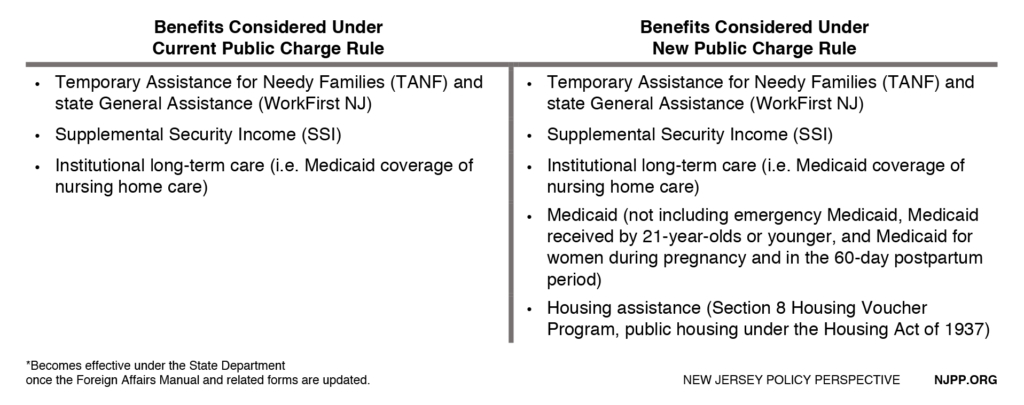UPDATE: On Monday, January 27, 2020 the U.S. Supreme Court voted 5-4 to allow the public charge rule change to take effect.
- What is the current public charge policy?
- Who is subject to public charge?
- Who is not subject to public charge?
- Which agencies enforce public charge?
- What would change under the new public charge rule?
- What is the public charge policy for immigrants who have applications processed outside the United States?
- What other factors are used to determine public charge outside the United States?
- Would the public charge rule change immigrants’ access to New Jersey programs?
- How would the public charge rule change harm immigrant families?
- Would the public charge rule change harm New Jersey’s economy?
New Jersey is home to the nation’s third largest share of immigrants, both documented and undocumented, who contribute greatly to the social and economic fabric of the state. Under the Trump administration, New Jersey’s immigrant residents face greater threats that put their health, safety, and future prosperity at risk. One such threat is the federal administration’s attempt to change the “public charge” policy, an inadmissibility test designed to identify people who may need public benefits in the future.[1] If the test determines that someone is likely to become a public charge, they would be denied admission to the United States or not be allowed to adjust their immigration status to lawful permanent residence (i.e. obtain a green card).[2] This brief answers frequently asked questions about the proposed public charge rule change.
It is important to note that immigrant families should not be fearful but educated on the issue of public charge so that they can make the best decision for themselves and their families.
What is the current public charge policy?
The public charge policy is a test that determines whether an immigrant is likely to use public cash assistance or institutional long-term care. The test applies to those who are applying for entry to the U.S., or for those seeking lawful permanent residence. Additionally, immigrants with green cards who are outside of the United States for more than six months could be subject to the public charge rule when they return.
The programs considered in the test are federal and state public cash assistance programs including Temporary Assistance for Needy Families (TANF), Supplemental Security Income (SSI), General Assistance, and institutional long-term .[3]If deemed a public charge, a person can be barred from entering into the U.S. or from obtaining lawful permanent residence status (LPR). (For more on which specific state programs are considered under the rule, see section, “Would the public charge rule change immigrants’ access to New Jersey programs”).
Who is subject to public charge?
The public charge rule primarily applies to people seeking to immigrate to the U.S. or adjust their immigration status to Legal Permanent Residents (LPRs) or green card holders through family-based petitions. It also will affect certain people seeking to extend or adjust their non-immigrant status (i.e. tourists) while in the U.S. [4]
Who is not subject to public charge?
Naturalized U.S. citizens are not subject to a public charge inadmissibility determination, nor are immigrants with lawful permanent residence status (LPR). Additionally, humanitarian immigrants, such as survivors of trafficking, domestic violence or other serious crimes, special immigrant juveniles, and certain other immigrants are not subject to a public charge test.
Other immigrants who are not subject to a public charge test include those who apply for:
- Deferred Action for Childhood Arrivals (DACA) renewals
- Refugee status
- Asylum status
- Temporary Protected Status (TPS)
- T and U visas (for victims of human trafficking and serious crimes or witnesses of certain crimes)
Which agencies enforce public charge?
The public charge policy is enforced by both the Department of Homeland Security (DHS) and the State Department. DHS is responsible for administering requests for adjustment of status and visas inside the United States and the State Department is responsible for handling similar requests made outside the U.S.
What would change under the new public charge rule?
In August 2019, the Trump administration proposed a radical change in the public charge policy that would expand the scope of public benefit programs considered in a public charge determination. The proposed rule change, which was scheduled to take effect on October 15 2019, includes public benefits programs such as the Supplemental Nutrition Assistance Program (SNAP), Medicaid, and certain subsidized housing programs.[5] The rule would apply a similar test to people seeking to extend or change their temporary visas, such as students or temporary workers.
Federal courts have temporarily blocked implementation of the rule for immigrants within the U.S., which is administered by the Department of Homeland Security. One court found that the rule raised serious questions about whether it violates the Equal Protection clause as well as the Rehabilitation Act, which prohibits discrimination against individuals with disabilities. The courts also found that the rule would cause immediate irreparable harm to states, counties, and organizations serving immigrants and their families.[6] In response, the Trump administration appealed these decisions.
However, the court’s actions do not apply to public charge determinations made outside of the U.S. by the State Department. The new public charge rule will be enforced by the State Department once new forms are finalized.

What is the public charge policy for immigrants who have applications processed outside the United States?
Outside the U.S., immigration officials within the State Department oversee visa applications and adjustment of status applications. In January 2018, the department revised its Foreign Affairs Manual (FAM) to change how immigration officials should weigh the affidavit of support that many U.S. sponsors must provide to demonstrate that an applicant will not become a public charge. In the past, an affidavit of support was generally considered enough to outweigh any public charge barrier.[7]
The FAM instructions also introduced other factors and thresholds that can be considered in a public charge test, such as new income thresholds, age, health, and health insurance considerations. Although it did not change the public charge definition, it allows officers to consider the use of any benefits by the applicant, family members or sponsors, thereby giving State Department officials more discretion to decide who is denied or approved.[8]
In fiscal year 2019, the State Department denied 5,343 immigrant visa applications for Mexican nationals based on their likelihood of becoming a public charge. This is a substantial increase from just seven denials under the last full year of the Obama administration.[9]
What other factors are used to determine public charge outside the United States?
The public charge test is based on a “totality of circumstances” assessment. This includes the applicant’s age, health, family status, income and resources, education and skills, and the validity of an affidavit of support. Positive factors can be weighed against negative factors, and no one factor will determine the outcome.
The following characteristics are considered under the Foreign Affairs Manual (FAM):
- Income, specifically whether the applicant earns less than 125 percent of the federal poverty level
- Age, specifically whether the applicant is 18 or younger or 62 and older
- Health, including complications that could interfere with the ability to work or care for oneself, increase future medical expenses, or require institutionalization
- Education, specifically whether the applicant has less than a high school degree
- Family size
- Prior history of using public benefits
Would the public charge rule change immigrants’ access to New Jersey programs?
Immigrants, regardless of status, who participate in state-funded programs — with the exception of WorkFirst NJ, which includes TANF and General Assistance — would not have their benefits considered under the public charge rule because the programs are state funded.
In New Jersey, immigrants who are undocumented and meet certain criteria are eligible for the following programs: in-state tuition, state financial aid, and NJ FamilyCare. These benefits would not be considered in the DHS or State Department public charge test.
Additionally, if New Jersey joins other states in expanding access for undocumented immigrants to obtain state health care, driver’s licenses, or other state-funded programs, these benefits would not be counted under the public charge rule.
How would the public charge rule change harm immigrant families?
The public charge rule is purposely complicated to instill fear in immigrant families, even if the new rule does not apply to them. As a result, many immigrants and their U.S. citizen family members have unenrolled or foregone public services that they are entitled to.[10] This is also known as the “chilling effect” of the public charge rule change. In New Jersey, it is estimated that 690,000 people — including 250,000 children — may be harmed by the chilling effect. This represents 34.5 percent of the state’s immigration population.[11]
According to a survey by the Urban Institute, one in every seven adults in immigrant families avoided signing up for a public benefit program in 2018 because of the public charge rule’s chilling effect.[12] In addition, half of health care centers around the nation reported that immigrants have declined to enroll or re-enroll themselves or their children in Medicaid in the past year for fear of the public charge rule. This was found to be especially true among immigrant pregnant women, according to the Kaiser Family Foundation.[13]
To reduce the negative impact that the chilling effect has on immigrant families and their U.S. citizen family members, it is important for community organizations and state agencies to conduct outreach, clarifying what the public charge rule is and what it means.
Would the public charge rule change harm New Jersey’s economy?
The new public charge rule, by harming immigrants and their families, also damages the broader state economy. As fewer immigrants sign up for health and nutrition programs, New Jersey can expect to lose $367 million in federal benefits.[14] The loss of these benefits could, in turn, harm local communities. Businesses such as grocery stores and supermarkets will likely lose income due to a decrease in SNAP enrollment.[15] Similarly, hospitals and health care providers will likely lose revenue with reduced enrollment in Medicaid and the Children’s Health Insurance Program (CHIP).
Overall, if the public charge rule change takes effect, New Jersey’s GDP is estimated to decline by as much as $709 million, with a related loss of 4,826 jobs and $38 million in lost state tax revenue, according to an analysis by the Fiscal Policy Institute.[16]
Acknowledgements
NJPP would like to thank Tanya Broder from the National Immigration Law Center (NILC) for reviewing this FAQ.
End Notes
[1] Protecting Immigrant Families. Updated: What Advocates Need to Know Now. Public Charge FactSheet. October 2019. https://protectingimmigrantfamilies.org/wp-content/uploads/2019/10/Public-Charge-10.17.19-Update.pdf
[2] Ibid 1.
[3] Ibid 1.
[4] Kaiser Family Foundation. Changes to “Public Charge” Inadmissibility Rule: Implications for Health and Health Coverage. August 2019. https://www.kff.org/disparities-policy/fact-sheet/public-charge-policies-for-immigrants-implications-for-health-coverage/
[5] Ibid 1.
[6] Protecting Immigrant Families. Conference Call. October 2019.
[7] Ibid 6.
[8] Ibid 6.
[9] Hesson,Ted. Exclusive: Visa denials to poor Mexicans skyrocket under Trump’s State Department. Politico, August 2019. https://www.politico.com/story/2019/08/06/visa-denials-poor-mexicans-trump-1637094
[10] New Jersey Policy Perspective. New Trump Regulation Puts New Jersey’s Health at Risk. August 2019. https://www.njpp.org/blog/new-trump-regulation-puts-new-jerseys-health-at-risk
[11] Fiscal Policy institute. Only Wealthy Immigrants Need Apply: The Chilling Effects of “Public Charge”. November 2019. http://fiscalpolicy.org/wp-content/uploads/2019/11/FINAL-FPI-Public-Charge-2019-MasterCopy.pdf
[12] Bernstein H. et. al. One in Seven Adults in Immigrant Families Reported Avoiding Public Benefit Programs in 2018. Urban Institute. https://www.urban.org/research/publication/one-seven-adults-immigrant-families-reported-avoiding-public-benefit-programs-2018
[13] Tolbert. S. etl. Al. Impact of Shifting Immigration Policy on Medicaid Enrollment and Utilization of Care among Health Center Patients. Kaiser Family Foundation. October 2019. https://www.kff.org/medicaid/issue-brief/impact-of-shifting-immigration-policy-on-medicaid-enrollment-and-utilization-of-care-among-health-center-patients/
[14] Ibid 11.
[15] Ibid 11.
[16] Ibid 11.

